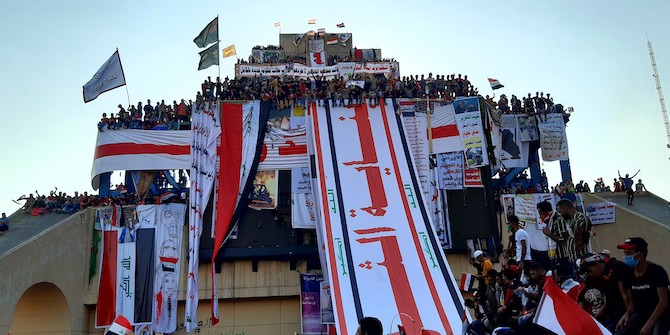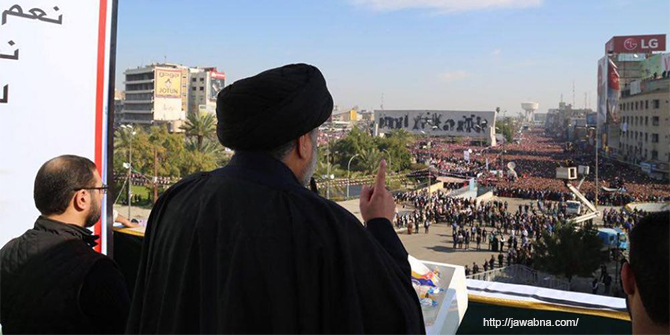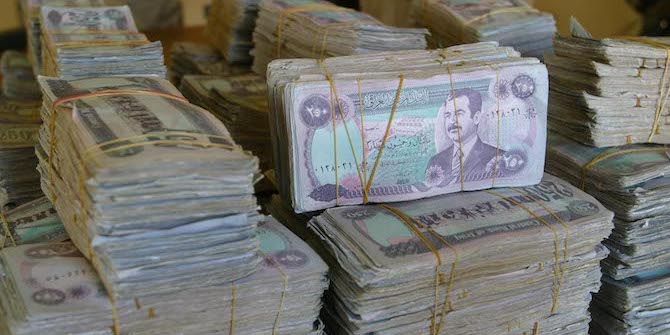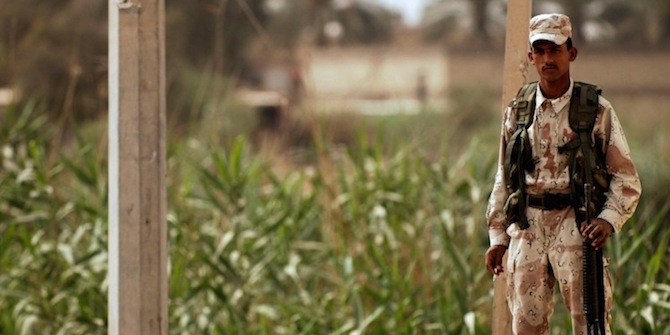by Hayder Al-Shakeri & Alfadhel Ahmad

Despite the end of the Tishreen protests in 2021, their political reverberations continue to resonate today. One prominent feature of post-Tishreen Iraq is the persistent pursuit by the Shiite Coordination Framework (SCF) – which currently forms the government – of new strategies to prevent the emergence of similar protests that could threaten the political system. The authorities’ previous approach of employing force – killing, abducting, and persecuting protesters – proved ineffective, resulting in over 800 deaths and 25,000 injuries, escalating the demonstrations and garnering them widespread public sympathy. This led to SCF-affiliated parties losing around 30 seats in the 2021 elections compared to their 2018 result.
With the brutal approach failing, the SCF sought more effective and cost-efficient forms of repression. They turned to a set of pre-2003 Ba’athist-era laws that remain in effect despite Iraq’s self-proclaimed ‘democracy’. These include Article 403 of the Penal Code on ‘indecent content’ and Articles 225-227, allowing authorities to detain anyone criticising the government for up to seven years.
Replacing Bullets with Bars
Laws adopted before 2003 have provided the tools to target dissenters. Article 226 allows for seven years imprisonment for ‘insulting the authorities’, without clearly defining the meaning or boundaries of such an offence. Post-2019, this article was used to issue arrest warrants for journalist Ahmed Mulla Talal and his guest Ayad al-Taie after performing a comedy skit about corruption allegations within the Ministry of Defence. Similar warrants were issued for journalist Mohammed Jabar, the host of the programme titled ‘Biwodooh (With Clarity)’, and writer/journalist Sarmed al-Taie. Additionally, journalist Saleh al-Hamdani was fired from the Iraqi Media Network for a Facebook post. The most recent use of this article was against activist Haider al-Zaidi, who was arrested for a tweet deemed ‘insulting’ to the Popular Mobilisation Forces (PMF).
The widespread use of Article 226 sparked outrage among activists and civil society organisations, forcing the authorities to backtrack, fearing public backlash. This was particularly relevant as they faced criticism for rising dollar exchange prices, food inflation, and concerns that Shiite leader Muqtada al-Sadr would exploit any unrest to topple the government.
This led to a shift to Article 403, which allows authorities to imprison individuals for up to two years for publishing content deemed to ‘violate public decency’. The subsequent arrest campaign targeting dozens of content creators was marketed as a fight against ‘indecent content’, claiming it aimed to protect families and society, and was not being used for political purposes. However, both this article and the subsequent one suffer from a fundamental legal flaw: neither provides a clear definition of ‘public decency’. This creates a vacuum where individuals can be prosecuted at the discretion of the Ministry of Interior. As with Article 226, ‘public decency’ could be interpreted as including political criticism, effectively silencing dissent.
Stigmatising Activists
With local elections approaching, government institutions and various political leaders have announced their intention to ‘combat gender ideology’ and ‘the spread of homosexuality’, portraying themselves as defenders of so-called Iraqi values and morals. This is primarily driven by electoral motives. The Iraqi government has failed to fulfil its fundamental obligations to its citizens, namely providing essential services, ensuring public safety and enhancing living standards. Moreover, the government lacks compelling electoral platforms to garner voter support. Instead of addressing these shortcomings, the government is resorting to exploiting moral issues as a diversionary tactic to deflect attention from its past 20 years of failures. Replacing discussions about services and accountability with broad and vague concepts such as ‘morals’, ‘values’, and ‘principles’ works to mask their governance failures.
The anti-gender campaign has had real impact on activists and has worked to shrink their operational space. Media outlets affiliated with the authorities have targeted several activists, linking them to, or distorting their associations with, Western institutions and governments. They have argued that through such links, activists are aiming to ‘spread decadence’ or are ‘endangering Iraqi values’, terminology aimed at ultimately stigmatising and socially isolating dissenters. One prominent example is feminist activist Hanaa Edwar who faced an organised media campaign against her and her organisation due to her activism.
This anti-gender campaign has not shielded society from the real dangers it faces, such as rising unemployment and widespread drug use and trafficking. However, it has effectively intimidated activists and fostered a culture of fear and caution towards political activities, negatively impacting political opposition movements in Iraq.
Friendly Fire
While the SCF’s focus has been on developing new repression methods to counter anticipated protests and limit the space for opposition, these tools have also been used against their own political allies. They successfully ousted former Parliament Speaker and Sunni leader Mohammed al-Halbousi using the legal instruments they recently gained expertise in – the same tools al-Halbousi previously utilised against his opponents in Sunni-majority areas. This demonstrates that opponents of the political system are no longer the sole victims of arbitrary repression; rather, it has rebounded against key players within the political class itself, who have long condoned the SCF’s expansion at the expense of the state.
This seizure of power will pave the way for the SCF to consolidate its control over various facets of the state. Currently, some of these forces seek to expand their sphere of influence by enacting a series of laws that restrict freedoms and grant greater powers of repression while weakening accountability and oversight mechanisms. This will only work to further limit civic space and stifle those voices that emerged after 2019 and who have long fought for a more democratic and accountable Iraqi state.
يمكنكم قراءة المقال باللغة العربية هنا







1 Comments